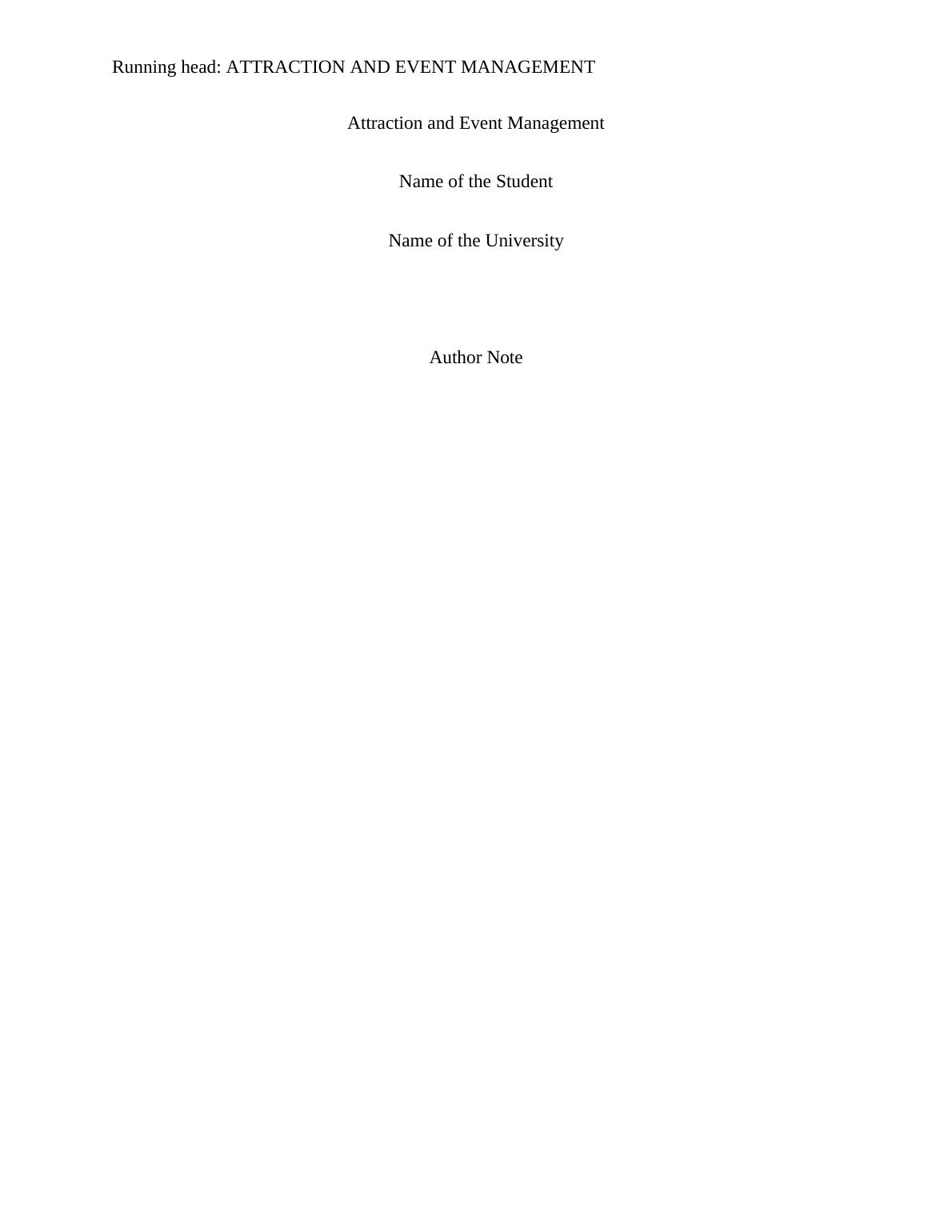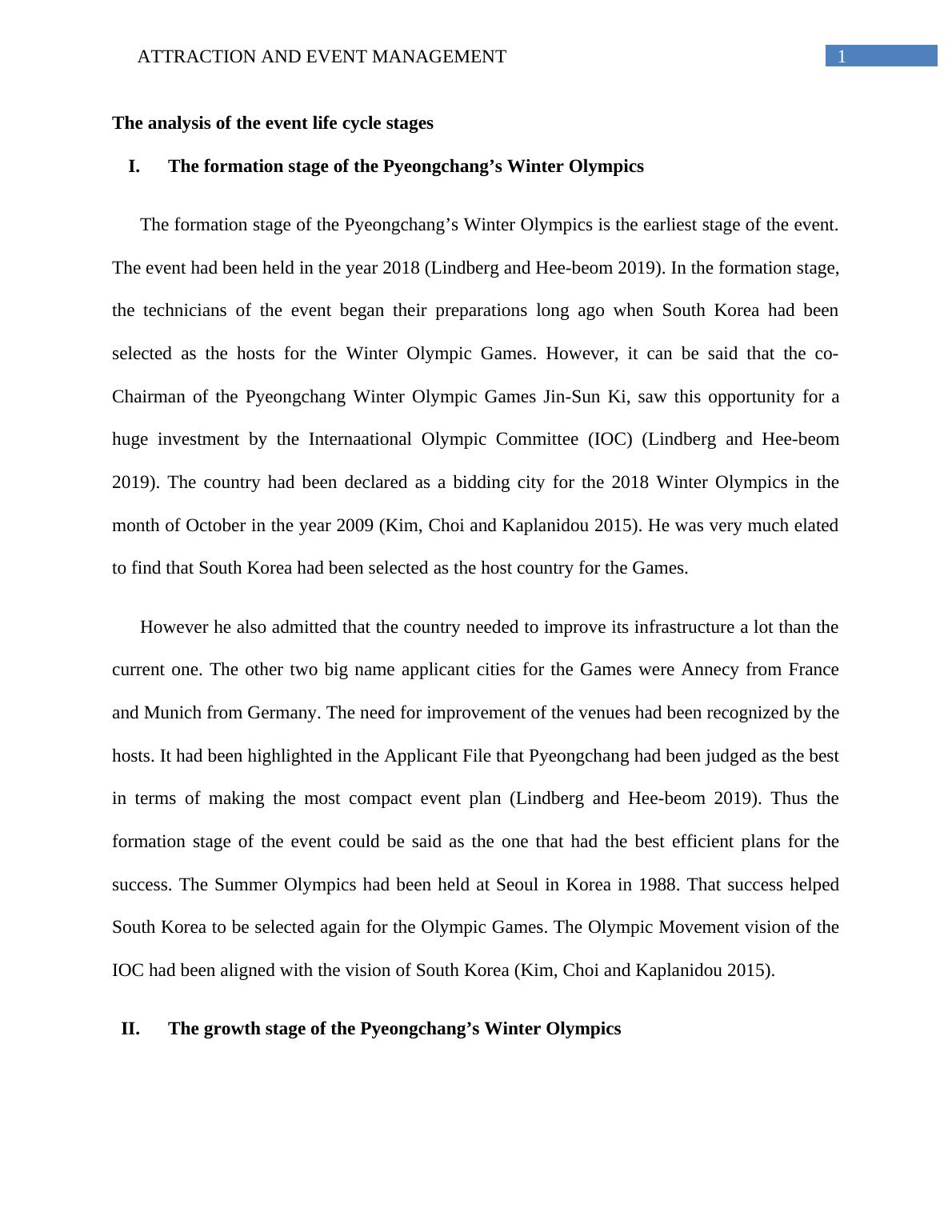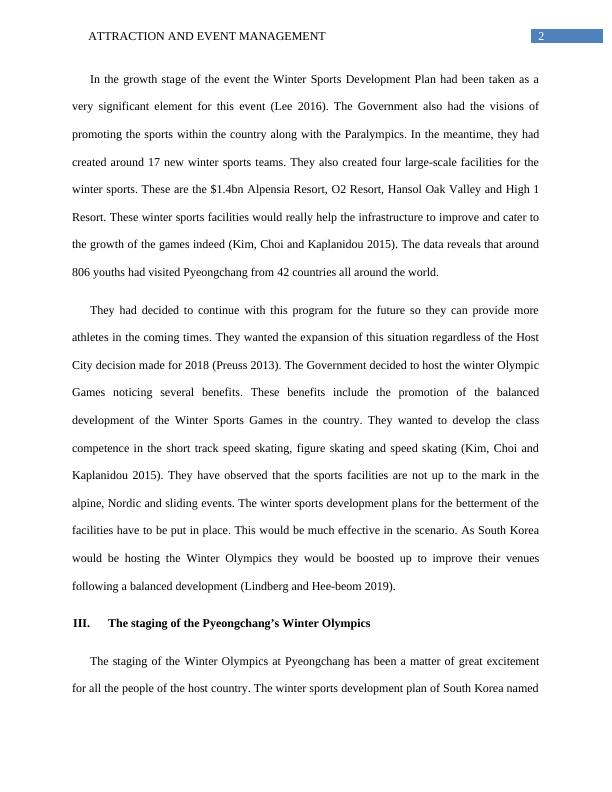Analysis of the event life cycle stages of Pyeongchang’s Winter Olympics
Added on 2023-04-22
7 Pages1794 Words454 Views
Running head: ATTRACTION AND EVENT MANAGEMENT
Attraction and Event Management
Name of the Student
Name of the University
Author Note
Attraction and Event Management
Name of the Student
Name of the University
Author Note

1ATTRACTION AND EVENT MANAGEMENT
The analysis of the event life cycle stages
I. The formation stage of the Pyeongchang’s Winter Olympics
The formation stage of the Pyeongchang’s Winter Olympics is the earliest stage of the event.
The event had been held in the year 2018 (Lindberg and Hee-beom 2019). In the formation stage,
the technicians of the event began their preparations long ago when South Korea had been
selected as the hosts for the Winter Olympic Games. However, it can be said that the co-
Chairman of the Pyeongchang Winter Olympic Games Jin-Sun Ki, saw this opportunity for a
huge investment by the Internaational Olympic Committee (IOC) (Lindberg and Hee-beom
2019). The country had been declared as a bidding city for the 2018 Winter Olympics in the
month of October in the year 2009 (Kim, Choi and Kaplanidou 2015). He was very much elated
to find that South Korea had been selected as the host country for the Games.
However he also admitted that the country needed to improve its infrastructure a lot than the
current one. The other two big name applicant cities for the Games were Annecy from France
and Munich from Germany. The need for improvement of the venues had been recognized by the
hosts. It had been highlighted in the Applicant File that Pyeongchang had been judged as the best
in terms of making the most compact event plan (Lindberg and Hee-beom 2019). Thus the
formation stage of the event could be said as the one that had the best efficient plans for the
success. The Summer Olympics had been held at Seoul in Korea in 1988. That success helped
South Korea to be selected again for the Olympic Games. The Olympic Movement vision of the
IOC had been aligned with the vision of South Korea (Kim, Choi and Kaplanidou 2015).
II. The growth stage of the Pyeongchang’s Winter Olympics
The analysis of the event life cycle stages
I. The formation stage of the Pyeongchang’s Winter Olympics
The formation stage of the Pyeongchang’s Winter Olympics is the earliest stage of the event.
The event had been held in the year 2018 (Lindberg and Hee-beom 2019). In the formation stage,
the technicians of the event began their preparations long ago when South Korea had been
selected as the hosts for the Winter Olympic Games. However, it can be said that the co-
Chairman of the Pyeongchang Winter Olympic Games Jin-Sun Ki, saw this opportunity for a
huge investment by the Internaational Olympic Committee (IOC) (Lindberg and Hee-beom
2019). The country had been declared as a bidding city for the 2018 Winter Olympics in the
month of October in the year 2009 (Kim, Choi and Kaplanidou 2015). He was very much elated
to find that South Korea had been selected as the host country for the Games.
However he also admitted that the country needed to improve its infrastructure a lot than the
current one. The other two big name applicant cities for the Games were Annecy from France
and Munich from Germany. The need for improvement of the venues had been recognized by the
hosts. It had been highlighted in the Applicant File that Pyeongchang had been judged as the best
in terms of making the most compact event plan (Lindberg and Hee-beom 2019). Thus the
formation stage of the event could be said as the one that had the best efficient plans for the
success. The Summer Olympics had been held at Seoul in Korea in 1988. That success helped
South Korea to be selected again for the Olympic Games. The Olympic Movement vision of the
IOC had been aligned with the vision of South Korea (Kim, Choi and Kaplanidou 2015).
II. The growth stage of the Pyeongchang’s Winter Olympics

2ATTRACTION AND EVENT MANAGEMENT
In the growth stage of the event the Winter Sports Development Plan had been taken as a
very significant element for this event (Lee 2016). The Government also had the visions of
promoting the sports within the country along with the Paralympics. In the meantime, they had
created around 17 new winter sports teams. They also created four large-scale facilities for the
winter sports. These are the $1.4bn Alpensia Resort, O2 Resort, Hansol Oak Valley and High 1
Resort. These winter sports facilities would really help the infrastructure to improve and cater to
the growth of the games indeed (Kim, Choi and Kaplanidou 2015). The data reveals that around
806 youths had visited Pyeongchang from 42 countries all around the world.
They had decided to continue with this program for the future so they can provide more
athletes in the coming times. They wanted the expansion of this situation regardless of the Host
City decision made for 2018 (Preuss 2013). The Government decided to host the winter Olympic
Games noticing several benefits. These benefits include the promotion of the balanced
development of the Winter Sports Games in the country. They wanted to develop the class
competence in the short track speed skating, figure skating and speed skating (Kim, Choi and
Kaplanidou 2015). They have observed that the sports facilities are not up to the mark in the
alpine, Nordic and sliding events. The winter sports development plans for the betterment of the
facilities have to be put in place. This would be much effective in the scenario. As South Korea
would be hosting the Winter Olympics they would be boosted up to improve their venues
following a balanced development (Lindberg and Hee-beom 2019).
III. The staging of the Pyeongchang’s Winter Olympics
The staging of the Winter Olympics at Pyeongchang has been a matter of great excitement
for all the people of the host country. The winter sports development plan of South Korea named
In the growth stage of the event the Winter Sports Development Plan had been taken as a
very significant element for this event (Lee 2016). The Government also had the visions of
promoting the sports within the country along with the Paralympics. In the meantime, they had
created around 17 new winter sports teams. They also created four large-scale facilities for the
winter sports. These are the $1.4bn Alpensia Resort, O2 Resort, Hansol Oak Valley and High 1
Resort. These winter sports facilities would really help the infrastructure to improve and cater to
the growth of the games indeed (Kim, Choi and Kaplanidou 2015). The data reveals that around
806 youths had visited Pyeongchang from 42 countries all around the world.
They had decided to continue with this program for the future so they can provide more
athletes in the coming times. They wanted the expansion of this situation regardless of the Host
City decision made for 2018 (Preuss 2013). The Government decided to host the winter Olympic
Games noticing several benefits. These benefits include the promotion of the balanced
development of the Winter Sports Games in the country. They wanted to develop the class
competence in the short track speed skating, figure skating and speed skating (Kim, Choi and
Kaplanidou 2015). They have observed that the sports facilities are not up to the mark in the
alpine, Nordic and sliding events. The winter sports development plans for the betterment of the
facilities have to be put in place. This would be much effective in the scenario. As South Korea
would be hosting the Winter Olympics they would be boosted up to improve their venues
following a balanced development (Lindberg and Hee-beom 2019).
III. The staging of the Pyeongchang’s Winter Olympics
The staging of the Winter Olympics at Pyeongchang has been a matter of great excitement
for all the people of the host country. The winter sports development plan of South Korea named

End of preview
Want to access all the pages? Upload your documents or become a member.
Related Documents
Analysis of 2018 Winter Olympic Games in Pyeongchanglg...
|10
|1725
|70
Sustainability of PyeongChang Winter Olympics 2018lg...
|7
|1999
|300
Attraction and Event Managementlg...
|11
|2178
|230
Case Study Analysis of 2018 Winter Olympics Held at Pyeongchanglg...
|8
|1947
|354
Pyeongchang Winter Olympics 2018lg...
|8
|1754
|360
Attraction and Event Management - Doclg...
|7
|1805
|129
